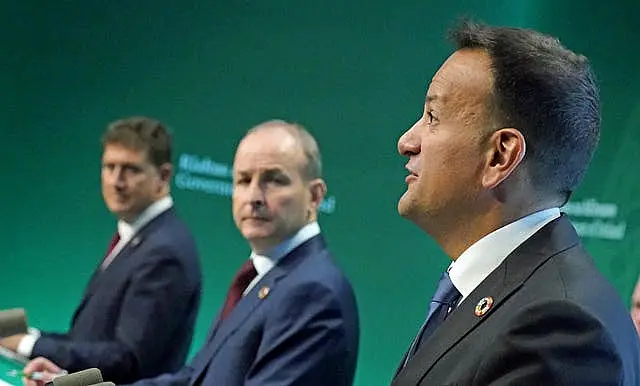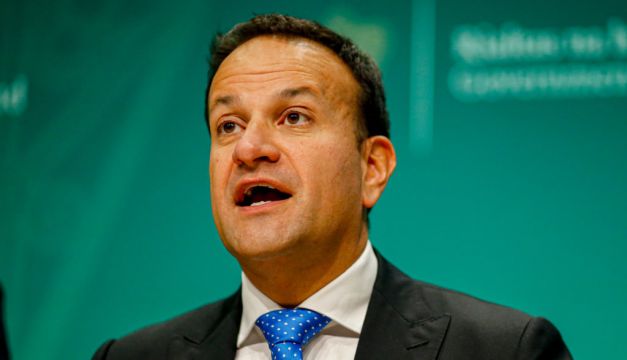House prices are likely to fall because of rising interest rates and the cost-of-living crisis, the Tánaiste has said.
Leo Varadkar said low interest rates had contributed to price inflation and it would “not be a bad thing” if prices dropped to allow more first-time buyers get on the property ladder.
He also said it was not a “huge surprise” that prices had started to show signs of levelling off given rising interest rates and the increased cost of living.
His comments come as a new report from the Economic and Social Research Institute (ESRI) found residential house prices in Ireland could be overvalued by 7 per cent or more.

In its latest quarterly economic commentary, the ESRI said the increase in savings by households during the pandemic may have been used in the market.
The report stated that another reason for the overvaluation could be the increasing share of non-household purchasers, such as institutional investors or local authorities.
Speaking after an industrial relations conference in UCD, Mr Varadkar said: “The likelihood is that we will see house prices moderate and even fall a bit in the period ahead.
“It’s only a straw in the wind but the most recent figures from MyHome.ie indicate a fall in house prices in the past three months, still going up year on year.
“But there are some signs that there’s increased availability of homes and that house prices are levelling off, are starting to fall back, and that isn’t a huge surprise.
“Interest rates are rising. And also, people are facing other costs with the rising cost of living.”
He said low interest rates had contributed to house price inflation in recent years.
“We’re now going back to a more normal era of more normal interest rates and that will help to moderate and even bring house prices down a bit,” he added.
“Particularly as there are so many people struggling to buy their first home that isn’t necessarily a bad thing.”
In its report the ESRI said the recent surge in savings and wealth is not sustainable over the medium term, and that the rate of house price increases will moderate.

“Even if the increase in prices can be explained by these developments it is clear, going forward, that the recent surge in savings and wealth is not sustainable over the medium term,” the ESRI said.
“Therefore, changes in house prices will become realigned with movements in income over this period.
“This means that recent increases in house prices are likely to moderate substantially over the short to medium term.”
Kieran McQuinn, research professor at the ESRI, said the estimation was carried out to the end of 2021.
“So given the very strong pace of house price growth in 2022, we’d say it’s (the overvaluation) at least 7%, if not more, at the present time,” he told RTÉ Morning Ireland.
“Clearly, I think the Irish market, like a lot of international housing markets, have experienced a kind of surge in prices over the last year or two.
“I think that’s mainly due to, in large part, the kind of growth and savings levels that people experienced during the pandemic.
“There’s a lot of evidence to suggest those savings work their way into the housing market, people use them obviously for deposits etc.
“But it has led to a surge in prices which has led prices to be above and beyond what we would expect them to be given the general state of economic conditions.
“Obviously, there’s headwinds coming down the market. We have rising interest rates so I think that will cool the market considerably over the next period of time.”
The report also found there will be a slowdown in the growth of the economy and decline in living standards but the country will avoid a recession.
It also expects inflation to average 8.1 per cent this year and to average 6.8 per cent next year.
Mr McQuinn said the Irish economy has been very robust and resilient, despite the international pressures and challenges, namely the pandemic and the war in Ukraine.
“It’s clear that the economy has continued to grow very strongly throughout the first half of 2022. Nonetheless, I think there is evidence that the pace of growth is beginning to slow somewhat,” he added.
“I guess that’s tied in with the persistence of the inflationary pressures that are there.
“A significant element of macroeconomic uncertainty and the prospect of a global recession which seems to be increasing.
“So, all of those factors will lead to the economy experiencing a more moderate rate of growth next year but we still believe on balance at this stage that the economy will continue to grow next year.
“There is a very strong dynamic in the Irish economy. What we are seeing, which I think is interesting, is the very strong performance of certain sectors, in particular the ICT and the pharma sectors.
“They’ve kind of remained somewhat immune to the kind of international pressures in recent years and that has allowed the Irish economy to, in some respects, kind of buck the international trends and continue to grow.”







